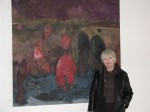Gilead
As a writer, my life involves more than a bit of reading, and never have I been more privileged as a reader than when I explored MarilynneRobinson’s Gilead (Farrar, Straus and Giroux, 2004).
For her efforts, she received the Pultizer Prize, and what a thrill to learn that she teaches at the University of Iowa Writers’ Workshop. I came upon her work quite fortuitously (at Boswell Books) when my well-read sister recommended her work after listening to her speak at the Kansas City Public Library.
And let me tell you how Tabor, Iowa figures into this. Tabor, (I’d never heard of it) is almost directly west of Villisca, where I grew up, nestled along the West Nishnabotna River. Robinson’s language is so sparse, that when she writes “you can smell the river,” you know exactly what she means — and yes, you can smell it.
The story is basically a “Prodigal Son” redux, but it meanders hither and yon (like a lazy day river) as an aged dying minister writes to his young son. It reaches back to Tabor’s early history as an “underground railroad” for slaves on the run, gives us Civil War snippets, and then on through World Wars I and II and III…
(This is as good a place as any to mention a most distressing conversation, albeit a blessedly brief one, with Tabor’s Historical Society. Seeking information about the underground railroad and other historical events which Robinson researched during her visits there, a friend of mine was met with “I hated that book. My friends all hated it.” End of conversation. How anyone could read this book and hate it is beyond belief.)
To put you at ease, Gilead records how we humans eternally question, well, eternity and what the narrator thinks is the meaning of life’s work. Was it a life wasted? Did his life disappoint? Where was the joy in his existence? For there on the wind-blasted, drought-ridden prairie surrounding Tabor, was where he chose to live in poverty and giving. Generations speak here. Sermons live through the words of the author. “What have I to leave you but the ruins of old courage, and the lore of old gallantry and hope,” he asks.
What is truth? What is lore?
The final pages whisper forth the preacher’s waning words to his small town (so reminiscent of the small town Iowa of my mind):
“To me it seems rather Christ like to be as unadorned as this place is. I love this town. I think sometimes of going into the ground here as a last wild gesture of love. I too will smolder away the time until the great and general incandescence.”
Droughts, influenza, the Depression and three terrible wars. Did you know the word “preacher” comes from an old French word, predicateur, which means prophet? And what, asks the old preacher as he shapes his question, “What is the purpose of a prophet except to find meaning in trouble? ‘What then does it mean to be useful?’ one may well ask. Is to be useful the highest state of grace?”
And then to his very young son, this: “I’ll pray that you grow up a brave man in a brave country. I will pray you find a way to be useful.”
And the final breath: “I’ll pray, and then I’ll sleep.”





















